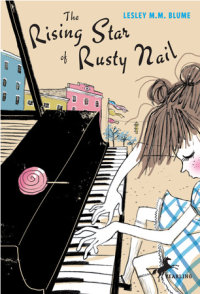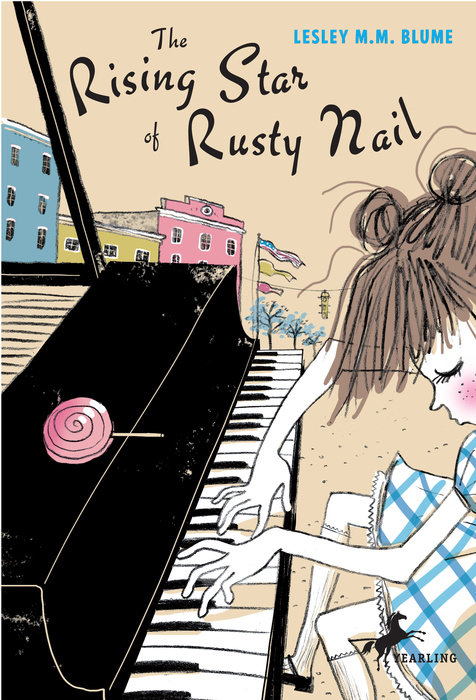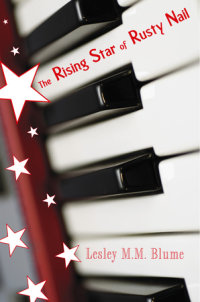The Rising Star of Rusty Nail
★ “A story that is as rich as it is delicious.”—Booklist, Starred
Franny Hansen is a 10-year-old piano prodigy living in Rusty Nail, Minnesota. Once the Coot Capitol of the world, in 1953 it's just a run-of-the-mill town with one traffic light and a bizarre cast of characters. She's long exhausted the talents of the town's only piano teacher and seems destined to perform at church events and school assemblies, until a mysterious Russian woman arrives in Rusty Nail. Franny's neighbors are convinced the "Commie" is a threat to their American way of life, but Franny's not so sure. Could this stranger be her ticket out of Rusty Nail?
Lesley M. M. Blume returns with the poignant and laugh-out-loud funny story of one girl's attempt to pursue the American dream in small town America.
“Blume has skillfully combined humor, history, and music to create an enjoyable novel that builds to a surprising crescendo.”—School Library Journal
An Excerpt fromThe Rising Star of Rusty Nail
"Franny, you throw like a girl," said Sandy with disgust as she expertly tied the end of a water-filled balloon into a knot.
"I do not," scowled Franny. "I got Rodney the jail janitor right on the back of the head, and you haven't even hit a single person."
"Oh yes, I did. I pegged ole Norma Smitty when you ran downstairs to get more water."
"Really?" said Franny suspiciously. "I didn't hear her yelling or anything."
"Oh, she yelled all right," boasted Sandy, tossing her balloon onto a gurgling pile of water bombs. "She said, 'Sandy Anne Hellickson and Frances Hansen--I know that's you up there! You ain't foolin' me! When I tell yer fathers that you was throwin' water bombs off the top of that buildin', yer gonna be sorry you was ever born!'"
The girls doubled up with laughter. They were stationed on the top of the two-story building on Main Street where Franny lived with her parents and two older brothers. With its wooden false front jutting five feet above the roof, the building was practically a skyscraper in their tiny town--if Rusty Nail, Minnesota, could really be described as a "town" at all. In reality, it was little more than a bunch of dusty houses and stores clumped together in the middle of nowhere. For miles and miles, a seemingly endless carpet of cornfields surrounded the community. Cows and rust-colored barns dotted the countryside, and tractors drove slowly along the dirt roads.
Long ago, Rusty Nail had been a pioneer outpost. But when the winters proved too harsh for the settlers, they took apart their makeshift wooden houses and piled the planks into their creaky covered wagons. No one knows where they went next, and the only thing they left behind was a pile of old bent nails. The next homesteaders who plunked along and settled in the area found these artifacts, and dutifully named the town Rusty Nail in 1879.
These days, in 1953, Rusty Nail's countryside was inhabited by weatherworn farmers, with a few store owners and regular folks mixed in. In the middle of the town square stood a sign, dulled by years of exposure to fierce summer thunderstorms and howling winter blizzards. It proclaimed:
WELCOME TO RUSTY NAIL!
FORMERLY THE AMERICAN COOT CAPITAL OF THE WORLD!
The American coot was a bird that looked sort of like a duck. Like the pioneers, one year they'd decided to just up and leave. Rumor had it that they found Iowa more to their liking, and as a result, Rusty Nail was left with only the fond memory of the Era of the Coot.
The sleepy town had only one of everything: one grocery store, one church, one lawyer, one doctor, one bar, even one old drunk who shambled aimlessly around the town square. There was even only one stoplight, which hung desolately on a thick wire over the intersection of Main Street and Church Street. Sometimes the light worked, and sometimes it didn't. But in any case, most of the townspeople drove their rusted Ford pickup trucks so slowly that it didn't matter one way or another.
Time dragged in Rusty Nail and nothing ever seemed to happen. Even the flies in the air seemed to stand still, as though suspended inside honey-colored amber. The slow passing of time showed itself by the rising and falling of the sun, the changing of the seasons, and children growing up and then growing old and replacing themselves with a new generation of children to grow up and grow old in Rusty Nail.
But most of the time, this didn't bother Franny and Sandy. To them, Rusty Nail was the center of the universe. They had been lifelong best friends, for ten whole years. Sandy was the undisputed ringleader, even though she was several months younger than Franny.
On this day, the last of summer vacation, Franny and Sandy were playing their favorite game: "Invasion of the Commies," as Russians were popularly known in those days. Inspired by a war movie the girls had seen at the rather shoddy Hauser's Movie Palace at the end of Main Street, the game involved throwing water balloons at people on the street below, pretending that they were looting-and-pillaging Russian soldiers. Franny and Sandy, of course, pretended to be American soldiers defending their hometown.
Only the day before, Sandy had received an extra-large mail shipment of water balloons from the Finkelstein Prank & Curiosity Company of Cedar Rapids, Iowa. This meant that the game could last until well after sunset--provided, of course, that they didn't get caught.
Sandy stood on a rickety metal stool, poked her head over the top of the false front, and surveyed the street below. A few farmers in dirty denim overalls lumped up the sidewalk and disappeared into the Arflot Saddle and Harness Store. The shredded, dirty screen door to Elmer's Bar slapped open, and Old Bill Codger shuffled out, scratching his rear end and blinking dimly in the late-afternoon sun.
Suddenly something caught Sandy's attention.
"Oh, goody," she said excitedly. "Stella's on her way up the sidewalk! Quick, pass me that balloon--I mean, that grenade."
She shoved a handful of cinnamon Red Hots into her mouth as Franny scrambled over with a water bomb. Stella Brunsvold owned the old-fashioned popcorn stand in front of Hauser's. A mean old gossip, she spent her time spitting out corn kernels at children and chasing them away from the theater.
"Here's the grenade, Lieutenant!" shouted Franny. "Let 'er rip!"
"Take that, Comrade!" Sandy yelled with glee as she tossed the balloon over the edge of the building. Comrade, according to the movies, was what Russians called each other. A few seconds later, the girls heard a satisfying splat! followed by a loud squawk.
"Quick--look and see if you hit her," said Franny urgently.
"Dang," Sandy said, peeking over the false front. "I missed Comrade Stella--but I did get the Snurrs." An ancient pair of spinsters who ran the five-and-dime store, the Snurr sisters still wore long black pioneer dresses that covered their wrists and ankles.
"They don't count," Franny scoffed. "They walk so slowly that a blind man could hit them."
"Fine, if you're such a good shot, then you hit Comrade Stella," said Sandy, tossing Franny a balloon. "Hey, Franny."
"What?"
"This is a lot more fun than practicin' the piano all day, huh?"
Franny paused. "Sure," she said, since that was clearly what Sandy wanted to hear.


